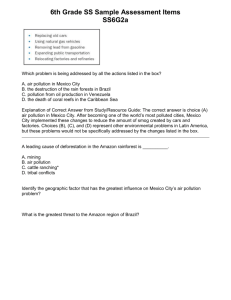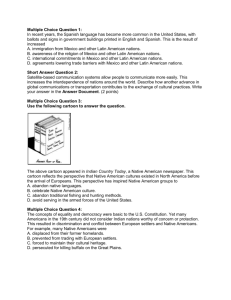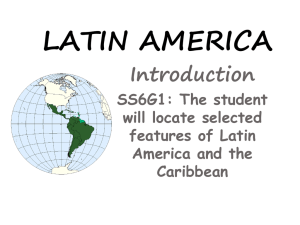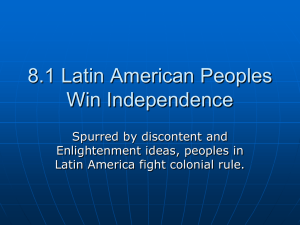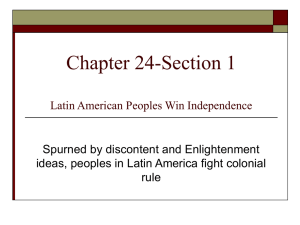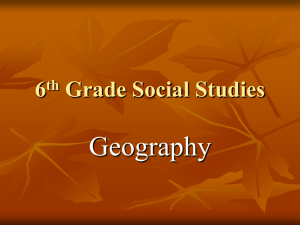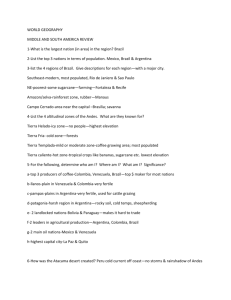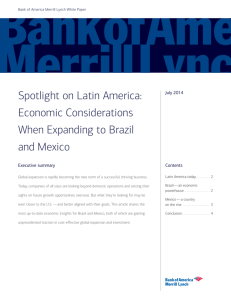IGS 560 - WordPress.com
advertisement
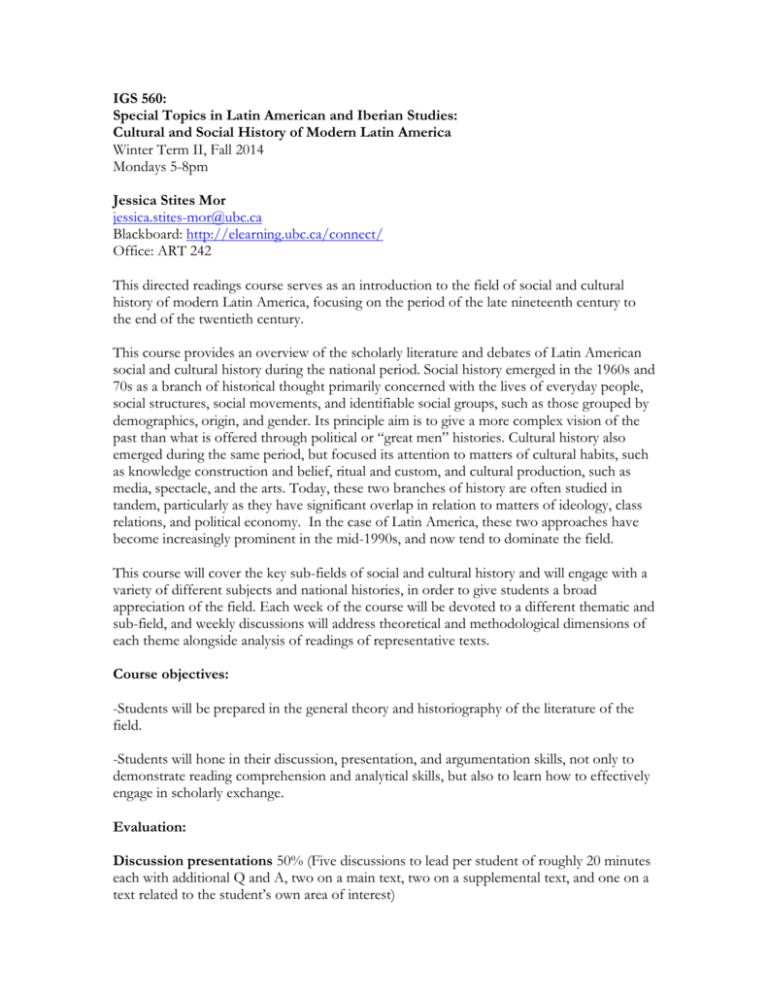
IGS 560: Special Topics in Latin American and Iberian Studies: Cultural and Social History of Modern Latin America Winter Term II, Fall 2014 Mondays 5-8pm Jessica Stites Mor jessica.stites-mor@ubc.ca Blackboard: http://elearning.ubc.ca/connect/ Office: ART 242 This directed readings course serves as an introduction to the field of social and cultural history of modern Latin America, focusing on the period of the late nineteenth century to the end of the twentieth century. This course provides an overview of the scholarly literature and debates of Latin American social and cultural history during the national period. Social history emerged in the 1960s and 70s as a branch of historical thought primarily concerned with the lives of everyday people, social structures, social movements, and identifiable social groups, such as those grouped by demographics, origin, and gender. Its principle aim is to give a more complex vision of the past than what is offered through political or “great men” histories. Cultural history also emerged during the same period, but focused its attention to matters of cultural habits, such as knowledge construction and belief, ritual and custom, and cultural production, such as media, spectacle, and the arts. Today, these two branches of history are often studied in tandem, particularly as they have significant overlap in relation to matters of ideology, class relations, and political economy. In the case of Latin America, these two approaches have become increasingly prominent in the mid-1990s, and now tend to dominate the field. This course will cover the key sub-fields of social and cultural history and will engage with a variety of different subjects and national histories, in order to give students a broad appreciation of the field. Each week of the course will be devoted to a different thematic and sub-field, and weekly discussions will address theoretical and methodological dimensions of each theme alongside analysis of readings of representative texts. Course objectives: -Students will be prepared in the general theory and historiography of the literature of the field. -Students will hone in their discussion, presentation, and argumentation skills, not only to demonstrate reading comprehension and analytical skills, but also to learn how to effectively engage in scholarly exchange. Evaluation: Discussion presentations 50% (Five discussions to lead per student of roughly 20 minutes each with additional Q and A, two on a main text, two on a supplemental text, and one on a text related to the student’s own area of interest) Critical reflection papers x 5 50% (students choose weekly readings to respond to and circulate reflection papers in advance of meetings, papers should not exceed three pages of double-spaced text and should include bibliographic references and footnotes, due 24 hours before the start of class each week, to be posted on the class Blackboard and also hard copy handed in to professor, under office door) Readings by week: 1. Introduction: What is social/cultural history? JSTOR 2. Race, Diaspora and Ethnicity Laura Putnam, Radical Moves: Caribbean Migrants and the Politics of Race in the Jazz Age Theresa Alfaro-Velkamp, So Far from Allah, So Close to Mexico, Middle Eastern in Modern Mexico Jeffrey Lesser, A Discontented Diaspora: Japanese Brazilians and the Meanings of Ethnic Militancy, 1960-1980 Robert Chao Romero The Chinese in Mexico or Grace Delgado Making the Chinese Mexican 3. Nation, State Formation, and Nationality Raymond Craib, Cartographic Mexico: A History of State Fixations and Fugutive Landscapes Louis A. Perez, On Becoming Cuban Mauricio Tenorio-Trillo, Mexico at the World’s Fair Rick Lopez, Crafting Mexico: Intellectuals, Artisans and the State after the Revolution 4. Gender, Sexuality and Women’s History Eileen Findlay, Imposing Decency: The Politics of Sexuality and Race in Puerto Rico, 1870-1920 Sueann Caulfield, In Defense of Honor: Sexual Morality, Modernity and Nation in Early-Twentieth Century Brazil James Green, Beyond Carnival: Male Homosexuality in Twentieth Century Brazil Ann Farnsworth-Alvear, Dulcinea in the Factory: Myths, Morals, Men and Women in Colombia’s Industrial Experiment 5. Class, inequality and culture Brodwyn Fischer, A Poverty of Rights: Citizenship and Inequality in Twentieth Century Rio de Janeiro Louise Walker, Waking from the Dream: Mexico’s Middle Classes after 1968 Amy Chazkel, Laws of Chance: Brazil’s Clandestine Lottery and the Making of Urban Public Life James Holston, Insurgent Citizenship: Disjunctions of Democracy and Modernity in Brazil 6. Popular Culture, Sport, and Mass Media Matt Karush, Class and Culture: Radio and Cinema in the Making of a Divided Argentina, 1920-1946 Brenda Elsey, Citizens and Sportsmen: Fútbol and Politics in Twentieth Century Chile Bryan McCann, Hello, Hello Brazil: Popular Music in the Making of Modern Brazil Robert Gonzales Echeverria, The Pride of Havana: A History of Cuban Baseball 7. Counterculture/Cultural Resistance Eric Zolov, Refried Elvis: The Rise of Mexcian Counterculture Christopher Dunn, Brutality Garden: Tropicalia and the Making of Brazilian Counterculture Jessica Stites Mor, Transition Cinema: Political Filmmaking and the Argentine Left since 1968 Ann Rubenstein, Bad Language, Naked Ladies and other Threats to the Nation 8. Confronting the Cold War Greg Grandin, The Last Colonial Massacre: Latin America in the Cold War Gilbert Joseph, et al., Close Encounters of Empire Michael Gobat, Confronting the American Dream: Nicaragua under U.S. Imperial Rule Claire Fox, Making Art Panamerican: Cultural Policy and the Cold War 9. Visual History John Mraz, Looking for Mexcio: Modern Visual Culture and National Identity Esther Gabara, Errant Modernism: The Ethos of Photography in Mexico and Brazil Joanne Hershfield, Imagining la Chica Moderna: Women, Nation and Visual Culture in Mexico, 1917-1936 Robert Levine, Images of History: 19th and Early 20th Century Latin American Photography 10. Space and place Ernesto Capello, City at the Center of the World Pablo Piccato, City of Suspects: Crime in Mexico City, 1900-1931 Jens Anderman, The Optic of the State: Visuality and Power in Argentina and Brazil Susana Draper, Afterlives of Confinement: Spatial Transitions in Postdictatorship Latin America 11. Consumption, Material Culture, and Everyday Life J.T. Way, The Mayan in the Mall: Globalization, Development and the Making of Modern Guatemala Eduardo Elena, Dignifying Argentina: Peronism, Citizenship and Mass Consumption William G. Acree, Jr., Everyday Reading: Print Culture and Collective Identity in the Rio de la Plata, 1780-1910 Lauren Derby, The Dictator’s Seduction: Politics and the Popular Imagination in the Era of Trujillo 12. Political Economies of Culture Miguel Tinker Salas, The Enduring Legacy: Oil Culture and Society in Venezuela Fernando Coronil, The Magical State: Money, Nature and Modernity in Venezuela Paul Vanderwood, Satan’s Playground: Mobsters and Movie Stars at America’s Greatest Gaming Resort Paul Gootenberg, Andean Cocaine: The Making of a Global Drug 13. Interiority, subjectivity, memory Victoria Langland, Speaking of Flowers: Student Movements and the Making and Remembering of 1968 in Military Brazil Carlos Aguirre, The Criminals of Lima and their Worlds: The Prison Experience, 1850-1935 Susana Kaiser, Postmemories of Terror Steve Stern, Battling for Hearts and Minds: Memory Struggles in Pinochet’s Chile, 1973-1988 Academic Integrity. The academic enterprise is founded on honesty, civility, and integrity. As members of this enterprise, all students are expected to know, understand, and follow the codes of conduct regarding academic integrity. At the most basic level, this means submitting only original work done by you and -acknowledging all sources of information or ideas and attributing them to others as required. This also means you should not cheat, copy, or mislead others about what is your work. Violations of academic integrity (i.e., misconduct) lead to the break down of the academic enterprise, and therefore serious consequences arise and harsh sanctions are imposed. For example, incidences of plagiarism or cheating usually result in a failing grade or mark of zero on the assignment or in the course. Careful records are kept in order to monitor and prevent recidivism. A more detailed description of academic integrity, including the policies and procedures, may be found at http://web.ubc.ca/okanagan/faculties/resources/academicintegrity.html. Grading Scale: As this is a graduate course, the expected criteria for achieving marks in the course are as follows: 93-99 Exceptional ability, demonstrated mastery of the subject and consistently outstanding quality of work 85-92 Work meets expectations of a graduate student, consistently good performance and high quality of work 80-84 Work meets passing expectations, but could stand to be improved to meet expectations of a successful graduate student 68-79 Work does not meet expectations of a graduate student, this range is considered a “fail” and the student may be consulted about whether or not they should change status to auditor or request standing deferred. *Below 80 in graduate coursework results in student’s ineligibility for SSHRC and internal research and travel grants. **Below 68 and the student will likely not be able to continue in graduate studies at UBC Okanagan. History Writing and Argumentation: These are the key elements I will be looking for in judging and marking your written work and your presentations in class. -Understanding of language, specifically familiarity and ability to utilize terminology from readings and class discussion, ability to utilize conceptual language to describe historical events and processes. -Strong thesis statements, frequently these reflect a modest rather than a bold contribution that is well situated within a broader context of work on the subject. -Referentiality: ability to easily make use of relevant works of scholarship and theory, capacity to put them to use to refine and build arguments. -Organized, careful, economic prose; well-chosen evidence to substantiate claims. -Ability to evaluate primary evidence, determine its usefulness and any limitations, and think critically about how such evidence is presented and interpreted. -Creative expression, ability to communicate original ideas in a clear manner, without having to rely on hackneyed or common turns of phrase. -Voice, confidence in assertions, presence of a defined perspective, ability to take a position. -Relevance, communication of meaning or significance of the topic, ability to connect debates across temporal and spatial divides. -Concreteness, precision in discussion and argumentation, solid connections between evidence and argument, avoidance of vague language and passive voice, assigning causality and agency. -Insight, reflects consideration, analytical development; moves forward a position. -Curiosity, asks meaningful historical questions that have the potential to generate new perspectives and/or deep lines of inquiry. -Editing, use of proper citations, careful formatting; copy is clean. How to Lead and Participate Effectively in a Discussion Seminar: Discussion leaders will have roughly 20 minutes to present the work that they have chosen from the readings. It is a good idea to prepare a handout or an overhead presentation to help underline key points, but be careful not to rely on such materials, the key to success is the oral presentation itself. For Discussion Leaders: The discussion should cover the following key items: 1. An introduction to the reading and topic: Who wrote the piece? What is their particular approach? What arguments are they responding to within their field? 2. Overview of the argument: Discuss author's main conclusions or positions, methodology, theoretical approach, sources. 3. Present your view: This is not just a matter of telling the group "how you feel" about these things, but rather, what kind of reasonable response you can give. Address the argument itself, the sources, the relationship between the reading and the body of work to which it responds. 4. Raise good questions: Spark discussion among peers by raising a set of significant questions. Question to open discussion, clarify and expand knowledge: Good discussion questions are not answered by "yes" or "no." Instead they lead to higher order thinking (analysis, synthesis, comparison, evaluation) about the work and the issues it raises. Good questions recognize that readers will have different perspectives and interpretations and such questions attempt to engage readers in dialogue with each other. Such questions depend on a careful reading of the text. Good discussion questions are simply and clearly stated. They do not need to be repeated or reworded to be understood or rely too heavily on jargon. Good discussion questions make (and challenge) connections between the text at issue and other works, and the themes and issues of the course. Ask small, detailed questions (like "what's the argument for this conclusion?") before large, abstract questions (like "how does this compare with what so-and-so said?"). Ask interpretative questions (like "what does the author mean here?") before evaluative questions (like "is the author right about this?"). Let your earlier questions lay a foundation for your later questions. Be flexible about your list of questions. If the discussion is going well, go with the flow, but always be ready to bring it back into line when it wanders away from the discipline, or becomes pointless. For Seminar Members: Successful discussion relies on your participation and preparation. 1. DO THE READING IN ADVANCE - this is absolutely essential for a seminar to work. You cannot rely on the presenter to explain things - there will be no discussion then, just a dry monologue. That's not a seminar. 2. Listen actively – What are the main contributions that the presenter has made to interpreting or understanding the text? Think about whether you think the presenter is getting the reading right. Is he/she missing some central issue? Has he/she not quite understood the argument? Are there implications of the argument that the presenter is not bringing to the surface? 3. Bring relevant outside material to the attention of the group, when appropriate. 4. Answer questions when you can, even if you can’t, try to respond in some way as to move forward the discussion. Listen to Record, Reflect and Respond: Listening is an essential skill and an important element of any discussion. Effective listeners don't just hear what is being said, they think about it and actively process it. • Be an active listener and don't let your attention drift. Stay attentive and focus on what is being said. • Identify the main ideas being discussed. • Evaluate what is being said. Think about how it relates to the main idea/ theme of the tutorial discussion. • Listen with an open mind and be receptive to new ideas and points of view. Think about how they fit in with what you have already learnt. • Test your understanding. Mentally paraphrase what other speakers say. • Ask yourself questions as you listen. Take notes during class about things to which you could respond. Discussion Etiquette: In order to successfully conduct and participate in a discussion, courtesy and respect are the basic ground rules. Do • Respect the contribution of others. Speak with courtesy to all members of the group. • Listen well to the ideas of other speakers; your response will be more informed if you pay attention to the points that they make. • Acknowledge what you find interesting. Particularly if it represents a different point of view. • Refrain from being argumentative. Learn to disagree politely. • Think about your contribution before you speak. How best can you answer the question contribute to the topic? • Try to stick to the discussion topic. Don't introduce irrelevant information. If the discussion does digress, bring it back on topic by saying something like 'Just a final point about the last topic before we move on' or 'that's an interesting point, can we come back to that later? Don't • Don't take offence if another speaker disagrees with you. Putting forward different points of view is an important part of any discussion. Others may disagree with your ideas, and they are entitled to do so. • Never try to intimidate or insult another speaker or ridicule the contribution of others. • Don’t dominate the discussion. Confident speakers should pause to allow quieter students a chance to contribute. • Avoid drawing too much on personal experience or anecdote. Although personal experiences can be helpful, remember not to generalize and to stay on point. • Don't interrupt or talk over another speaker. Let them finish their point before you start.
